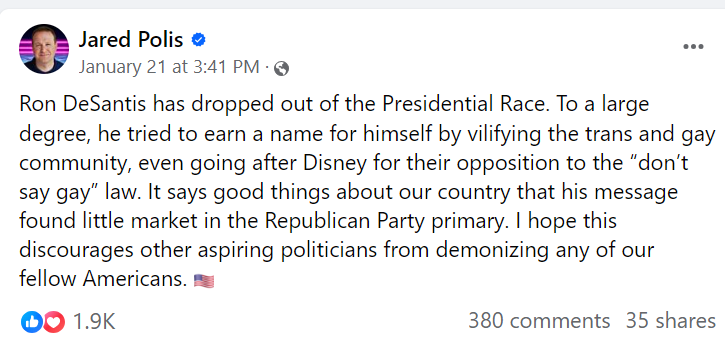GOP Fight for 2024 nomination II
- Thread starter Crimson1967
- Start date
I haven't seen much yet, but it's early and I've been busy with other matters...What are the polls saying about Haley's results in New Hampshire tonight?
Same here.I haven't seen much yet, but it's early and I've been busy with other matters...
Would be interesting to see some decent polling PRE-election, that takes into account the independents......
Exit polls from NH……don’t ever believe them.Same here.
Would be interesting to see some decent polling PRE-election, that takes into account the independents......
Pollster Frank Luntz is saying Trump will win but it will be closer than most have called it. He’s projecting 4-8 point Trump win fwiw.
I'm interested in the predictions vs the results.Exit polls from NH……don’t ever believe them.
Don't understand why that is a problem......
Last edited:
New Hampshire's primary represents some unique challenges to the eventual result of polling:I'm interest in the predictions vs the results.
Don't understand why that is a problem......
1) unlike most other states with primaries, the candidates tend to spend more time in NH per capita than any other place, and the state is small enough for the voters to make an INFORMED choice and change their minds due to repeated exposure (this more in cases of multi-candidate fields)
2) New Hampshire became MORE important with the creation of the Iowa caucuses in 1976 because basically it turned into an almost "you have to win at least one or go home." And because of the attention the winner of Iowa got - and Iowa is easy to pull an upset in since it puts a premium on passion and willingness to have others know for whom you voted - the polls rocket all over the place. (This got worse when the time frame moved from a month like in 1980 to less than a week in 2008).
3) New Hampshire - with the exception of the miniscule number of African-Americans (2%) - has one of the most representative cross-sections of voters in the entire US (it's 92.7% white and 50.7% female. And perhaps more so than any other state, you have voters from there who would vote for the President of the NRA on the issue of guns and with Bernie Sanders on universal healthcare - these positions in the EXACT SAME VOTER.
4) The Yankees of New Hampshire who aren't passionately liberal or conservative - and that's a chunk of them - refuse to talk to pollsters, which skews the results. I lived in Salem, NH last year, and to my utter shock there was a "Trump Superstore" there selling Trump merchandise. The willingness of the extremists to talk but the less passionate to be more reserved than the average voter skews it, too. (Note: I cannot explain the WHY, but I have observed this in both my assignments up here and one of my good friends is a lifelong New Hampshire native who concurred with my assessment but couldn't really explain the "why" either other than a lot of the state IS rural (but not rural Alabama).
===================
The example that has always stood out to me is the 1992 GOP primary result:
Bush 53%
Buchanan 38%
Now, I'm not going to blame this particular result on the media, but what happened in the early exit polls for most of the day was the press was getting the count around 52-48 in favor of Bush, borderline 1968 McCarthy win while losing territory. The press such as it was in 1992 reported that every 1/2 hour on CNN Headline News all day so that by the time the evening news hit, the President less than a year after winning that Gulf War and rising to 91% was being repudiated by his own party. But then the actual votes were counted and, well, you can usually figure 1/3 of a normal electorate is against an incumbent (well, in pre-Trump politics you could). So Buchanan getting 30-35% of the vote wasn't even a story in the real world. Richard Nixon got 17% of the GOP primary vote in 1964 WHEN HE WASN'T EVEN RUNNING!!! (15,000 people wrote him in - because you can do that there). But when the press was conditioned to believe, "Oh my, Pat Buchanan is within four points of knocking off Bush, who is from New England," it was because of the exit polls. The election post-mortem opted to say that Buchanan voters were more likely to admit they voted for him than Bush voters did.
You may also remember the 1996 Senate election in NH.
That's the night all the networks called the seat for Democrat Dick Swett (Yes, that's his name, folks!) over Republican Bob Smith. The Voter News Service made an honest mistake in how they did their caclculations, fixed it, and life went on.
But you're correct that polling prediction vs results in New Hampshire is.....well, it's like some of the elections in Florida have been.
Last edited:
Unfortunate another guy has cornered the market on being callous and inhumane to the American people...
Nobody is beating Trump. DeSantis didn’t lose because Republicans are taking a stand against homophobia.
yeah, i think gov. polis is trying to civilly push back against some of the more abhorrent anti-gay/trans rhetoric that came out of the desantis camp by attaching it to such a massive loser.Nobody is beating Trump. DeSantis didn’t lose because Republicans are taking a stand against homophobia.
Trump attacks Haley for absence of her husband, who is deployed
Former President Donald Trump used a rally in South Carolina on Saturday to attack rival Nikki Haley in her home state — and to mock the absence of her husband, who is deployed overseas.
“Where’s her husband? Oh, he’s away. … What happened to her husband? Where is he? He’s gone,” Trump said at his rally in Conway, his first visit to the state this year.
Michael Haley is deployed in Africa with the South Carolina Army National Guard in support of the United States Africa Command, his second active-duty deployment overseas.
Nikki Haley fired back at Trump’s comments later Saturday, saying, “If you mock the service of a combat veteran, you don’t deserve a driver’s license, let alone being president of the United States.”
“Donald, if you have something to say, don’t say it behind my back; get on a debate stage and say it to my face,” she told a crowd in Gilbert, South Carolina.
In a rare move, Michael Haley fired back at the former president, posting a meme on Twitter reading, “The difference between humans and animals? Animals would never allow the dumbest ones to lead the pack,” while mentioning Trump’s account in the caption.
Not to sound like some sort of woke feminist but why does it matter where her husband is? If he was sitting at home playing video games that’s fine with me. Does anyone ask where Melania is if he is giving a speech somewhere and she is absent?
But millions of women will vote for him because he aligns with them.
But millions of women will vote for him because he aligns with them.
Haley will win DC GOP primary, CNN projects
“It’s not surprising that Republicans closest to Washington dysfunction are rejecting Donald Trump and all his chaos,” Haley spokesperson Olivia Perez-Cubas said in a statement that touted the former governor as the first woman to win a GOP presidential primary.
Thankfully, Trump appears pretty weak right now, not just in DC but in every state that has had their primary already.
Haley will win DC GOP primary, CNN projects
“It’s not surprising that Republicans closest to Washington dysfunction are rejecting Donald Trump and all his chaos,” Haley spokesperson Olivia Perez-Cubas said in a statement that touted the former governor as the first woman to win a GOP presidential primary.
That doesn't necessarily translate to the general, especially if people don't show up for Biden.
Latest threads
-
BREAKING Philip Rivers officially retires as a Charger today. Great video.
- Started by BamaNation
- Replies: 0
-
-
-





